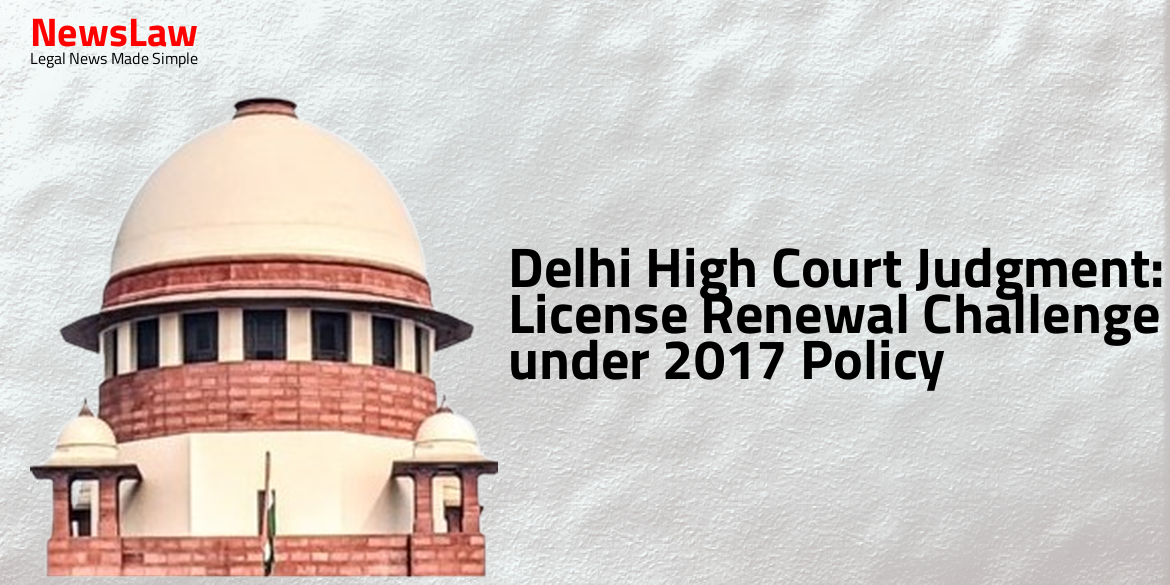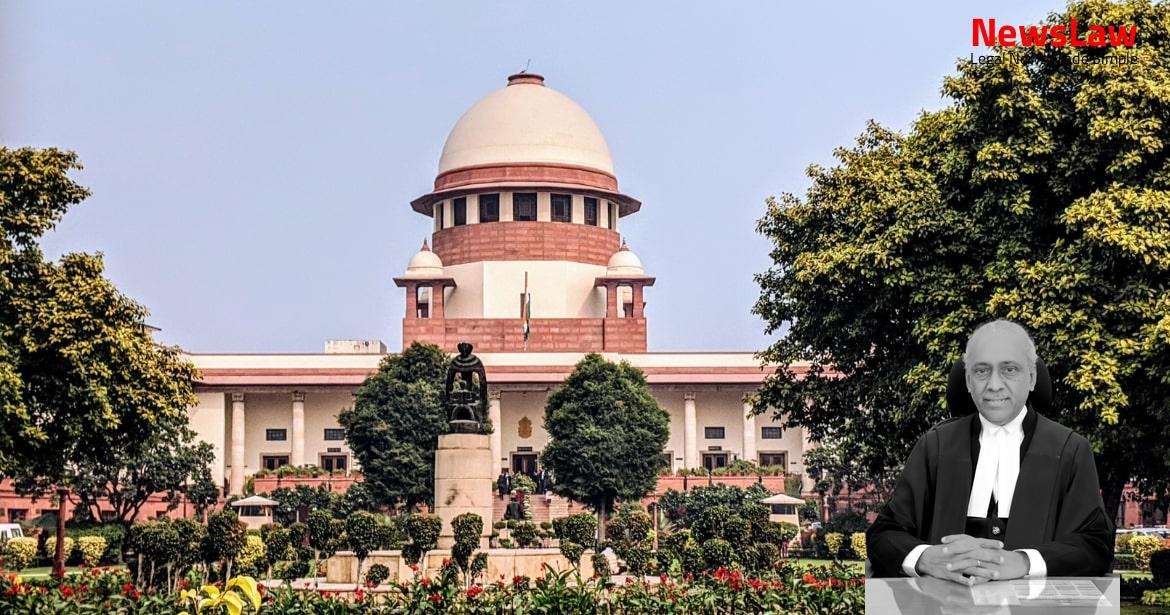In a recent ruling by the Delhi High Court, a challenge to license renewal under the 2017 Policy was adjudicated upon. The case involved multiple petitioners seeking renewal against the Northern Railway authority. Stay tuned for insights into the court’s decision and its implications on license agreements and policy compliance.
Facts
- As per Clause 3 of the Master License Agreements, the tenure of the petitioners’ licenses was initially for five years from the date of conversion of stall/trolley till 21.12.2022.
- Due to the force majeure event of the Covid-19 lockdown, the tenure was extended by 68 days until 27.02.2023.
- The extension was communicated through letters dated 14.12.2022 sent by the authority.
- The agreements expressly stated that there would be no further extension or renewal of the agreement.
- The petitioners and the authority had executed Master License Agreements on specific dates for their miscellaneous stalls/trolleys, which were then converted to MPS under the 2017 Policy.
- The petitioners were asked to vacate their MPS by 27.02.2023 as per the communicated directive.
- Each petitioner was operating their respective MPS at different railway stations as mentioned in the petition.
- The petitioners were compelled to convert their stalls/trolleys to MPS in line with the 2017 Policy enforced by Northern Railway.
- The agreements were signed by each petitioner and the authority to formalize the license arrangement.
Arguments
- The petitioners argue that the 2017 Policy is arbitrary in extending its applicability to existing stalls and trolleys.
- They contend that the 68-day extension due to Covid-19 is arbitrary, especially when compared to longer extensions granted in other railway zones.
- The petitioners seek an extension of their license period proportionate to the reduction in fees post-lockdown.
- They claim that Clause 5 of the 2017 Policy violates constitutional articles by taking away the right to license renewal and forcing competition against larger companies.
- The petitioners demand a writ of mandamus to compel the relevant zonal railways to renew and extend their licenses.
- They argue that the 2017 Policy is arbitrary, but the Karnataka High Court dismissed a similar challenge against it.
- The petitioners express a legitimate expectation for license renewal, citing cases and maintaining that the 2017 Policy prevents monopolization and provides equal opportunity.
- The learned senior counsel for the petitioners contends that refusal to renew licenses for miscellaneous stalls/trolleys is arbitrary, echoing judgments for license renewal.
- They argue that they were coerced into converting their stalls to MPS units under unequal bargaining power.
- The petitioners’ submission that they were forced to sign the new policy without the option of renewal is rejected, emphasizing the balance between livelihood and equal opportunity.
- They stress a legitimate expectation for license renewal throughout their lifetime and future generations.
- The petitioners broadly contend that respondents should renew their licenses as per the Supreme Court’s judgment.
- They claim that the Railway Act is violated and conversion to MPS units was done under coercion and economic duress.
- The petitioners are challenging the non-renewal based on the 2017 Policy and oppose the application of paragraph 1744 for punitive demands.
- The petitioner signed a contract for a period of five years which was non-renewable.
- The petitioner cannot claim ignorance as the terms of the contract were clearly stated in the letter of award.
- The petitioner enjoyed the benefits of the contract for five years.
- The petitioner cannot now seek to revert to a policy that is no longer in force or applicable to them.
- The Karnataka High Court rejected the petitioner’s argument that the non-renewal of the license goes against a Supreme Court judgment, stating that the judgment referred to a different policy not applicable to the petitioner in this case.
Analysis
- The 2017 Policy includes a 33% sub-quota for women in the allotment of reserved category of MPS at all stations.
- Clause 9 of the 2017 Policy provides for reservation in allotment for marginalized sections of society.
- The petitioners voluntarily converted their stalls/trolley to MPS, as per letters issued by the Railway Board.
- The Force Majeure clause was invoked for non-operational catering and vending contracts during the lockdown.
- The petitioners did not protest against the conversion of their stalls to MPS in previous years.
- The petitioners’ claim of a legitimate expectation for license renewal is not supported.
- The 2017 Policy does not allow for extension or renewal of MPS licenses, rather encourages participation in fresh bids.
- The Supreme Court has previously held that license renewal can only be claimed when explicitly provided in the policy.
- Government-imposed lockdown due to Covid-19 led to an extension of license periods for the petitioners.
- The petitioners can participate in future tenders for MPS units as per the policy.
- Paragraph 55 of the judgment provides relevant information.
- This part of the judgment discusses specific details or findings.
- It may outline key points related to the case or its background.
- The details within this section may be crucial to understanding the overall judgment.
- The courts have the jurisdiction to declare the law as unconstitutional.
- Judicial review of a policy decision and to issue mandamus to frame policy in a particular manner are absolutely different.
- A legitimate expectation, even when made out, does not always entitle the expectant to a relief.
- No public body under our constitutional system is vested with such arbitrary powers.
- A Mandamus lies for enforcement of a fundamental right or a statutory right, or the enforcement of a fundamental duty related to enforcement of a fundamental right or a statutory right.
- Individual license agreements and the 2017 Policy contain an arbitration clause for aggrieved parties.
- Petitioners can use the arbitration clause in case of insufficiency of extension due to Covid-19 or to claim damages.
- Formal execution of the license agreement is not a prerequisite to invoking the arbitration clause.
- Petitioners are free to initiate appropriate proceedings through arbitration if needed.
Decision
- Existing stalls/trolleys have the option to convert into Multipurpose Stalls (MPS) as per the 2017 Policy.
- Existing licensees were given two options: convert to MPS or continue with existing stalls/trolleys till agreement expiry.
- Petitioners opted to convert to MPS for the advantages offered by the 2017 Policy.
- Space for new MPS will be allotted by Zonal Railways after current agreement expiry.
- Existing stalls can be converted to MPS by paying the quoted License Fee for MPS units at the station/platform.
- The tenure of 5 years for MPS starts from the date of conversion.
- The batch of petitions is deemed maintainable and entertained by the Court for adjudication on merits.
- Batch of petitions is disposed of with petitioners seeking conversion of stalls/trolleys to MPS.
- Court grants a 3-month period for petitioners to vacate stalls to make alternative vending arrangements.
Case Title: ZIYAUDDIN MANGLORE Vs. UNION OF INDIA & ORS. (2024:DHC:4452)
Case Number: W.P.(C)-205/2024



